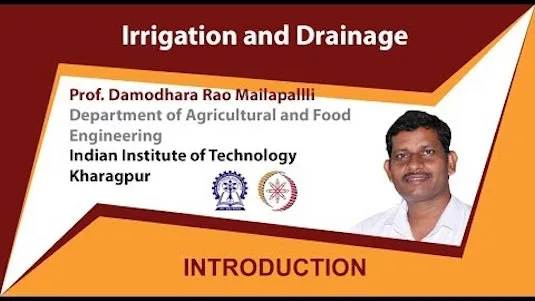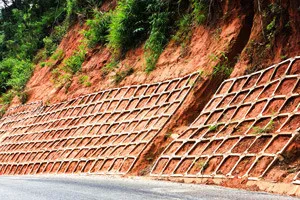
Irrigation And Drainage 
This course provides an introduction to the principles of irrigation and drainage in agricultural engineering. It covers topics such as soil-water-plant-atmosphere relationships, crop water requirements, irrigation scheduling, water conveyance, water application methods, irrigation systems design and performance evaluation, drainage of agricultural lands, management of salt affected soils, ground water hydrology, irrigation wells and water-lifting devices. It is suitable for undergraduate and graduate students in Agricultural Engineering/Agricultural Sciences with a background in chemistry, physics and maths. It includes weekly quizzes, in-class numerical problem solving, assignments and class tests. ▼
ADVERTISEMENT
Course Feature
![]() Cost:
Cost:
Free
![]() Provider:
Provider:
Swayam
![]() Certificate:
Certificate:
Paid Certification
![]() Language:
Language:
English
![]() Start Date:
Start Date:
23rd Jul, 2023
Course Overview
❗The content presented here is sourced directly from Swayam platform. For comprehensive course details, including enrollment information, simply click on the 'Go to class' link on our website.
Updated in [May 25th, 2023]
This course, Irrigation and Drainage, is designed to provide an overview of the principles of agricultural engineering and their application in agricultural production. It focuses on the soil-water-plant-atmosphere relationship, crop water requirement, irrigation scheduling, irrigation water conveyance, measurement of irrigation water, water application methods, irrigation systems design and their performance evaluation, drainage of agricultural lands, management of salt affected soils, performance evaluation of drainage systems, ground water hydrology, irrigation wells and water-lifting devices-pumps.
This course is recommended for undergraduate and graduate students in Agricultural Engineering/Agricultural Sciences. It is beneficial for those who have an introductory background in chemistry, physics and Maths (calculus). It is also beneficial for those in the irrigation-based industry.
The course involves weekly quizzes, in-class numerical problem solving, assignments and class tests. Upon completion of the course, students will have a better understanding of the principles of agricultural engineering and their application in agricultural production.
[Applications]
Upon completion of this course, students will be able to apply the principles of irrigation and drainage in agricultural production. They will be able to understand the soil-water-plant-atmosphere relationship, calculate crop water requirements, design irrigation systems, evaluate their performance, and manage salt-affected soils. Additionally, they will be able to understand ground water hydrology, irrigation wells, and water-lifting devices. This course will be beneficial to students interested in working in the irrigation-based industry.
[Career Paths]
1. Irrigation Engineer: Irrigation engineers are responsible for designing, constructing, and maintaining irrigation systems. They must have a strong understanding of soil science, hydrology, and engineering principles. As the demand for water resources increases, irrigation engineers are in high demand to develop efficient and sustainable irrigation systems.
2. Drainage Engineer: Drainage engineers are responsible for designing and constructing drainage systems to manage water resources. They must have a strong understanding of hydrology, soil science, and engineering principles. As the demand for water resources increases, drainage engineers are in high demand to develop efficient and sustainable drainage systems.
3. Water Resources Manager: Water resources managers are responsible for managing water resources in an efficient and sustainable manner. They must have a strong understanding of hydrology, soil science, and engineering principles. As the demand for water resources increases, water resources managers are in high demand to develop efficient and sustainable water management strategies.
4. Agricultural Engineer: Agricultural engineers are responsible for designing and constructing agricultural systems to maximize crop production. They must have a strong understanding of soil science, hydrology, and engineering principles. As the demand for food production increases, agricultural engineers are in high demand to develop efficient and sustainable agricultural systems.
[Education Paths]
1. Bachelor of Science in Agricultural Engineering: This degree program provides students with a comprehensive understanding of the principles and practices of agricultural engineering. Students learn about soil and water management, irrigation and drainage systems, crop production, and agricultural machinery. They also gain knowledge in areas such as soil science, hydrology, and environmental engineering. This degree is ideal for those interested in pursuing a career in agricultural engineering, as it provides the necessary skills and knowledge to work in the field.
2. Master of Science in Agricultural Engineering: This degree program is designed for those who want to specialize in a particular area of agricultural engineering. Students learn about advanced topics such as soil and water conservation, irrigation and drainage systems, crop production, and agricultural machinery. They also gain knowledge in areas such as soil science, hydrology, and environmental engineering. This degree is ideal for those interested in pursuing a career in agricultural engineering, as it provides the necessary skills and knowledge to work in the field.
3. Doctor of Philosophy in Agricultural Engineering: This degree program is designed for those who want to specialize in a particular area of agricultural engineering. Students learn about advanced topics such as soil and water conservation, irrigation and drainage systems, crop production, and agricultural machinery. They also gain knowledge in areas such as soil science, hydrology, and environmental engineering. This degree is ideal for those interested in pursuing a career in agricultural engineering, as it provides the necessary skills and knowledge to work in the field.
4. Master of Business Administration in Agricultural Engineering: This degree program is designed for those who want to specialize in a particular area of agricultural engineering. Students learn about advanced topics such as soil and water conservation, irrigation and drainage systems, crop production, and agricultural machinery. They also gain knowledge in areas such as soil science, hydrology, and environmental engineering. This degree is ideal for those interested in pursuing a career in agricultural engineering, as it provides the necessary skills and knowledge to work in the field. Additionally, this degree provides students with the business skills needed to manage and lead agricultural engineering projects.
Course Provider

Provider Swayam's Stats at AZClass
Discussion and Reviews
0.0 (Based on 0 reviews)
Explore Similar Online Courses

Deep Learning: Convolutional Neural Networks in Python

Golang: Intro to REST APIs with Go programming lang (Golang)

Python for Informatics: Exploring Information

Social Network Analysis

Introduction to Systematic Review and Meta-Analysis

The Analytics Edge

DCO042 - Python For Informatics

Causal Diagrams: Draw Your Assumptions Before Your Conclusions

Whole genome sequencing of bacterial genomes - tools and applications

Advanced Erosion Control Measures

Environmental Studies


Start your review of Irrigation And Drainage